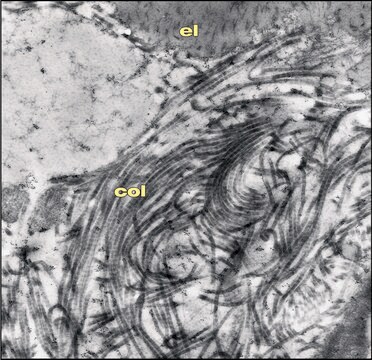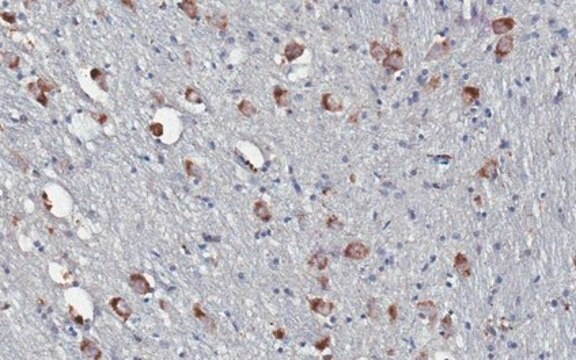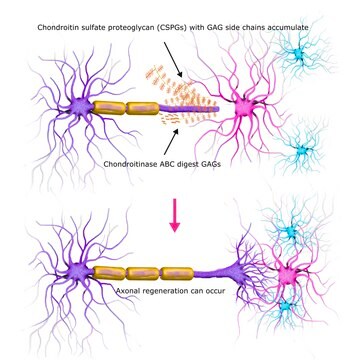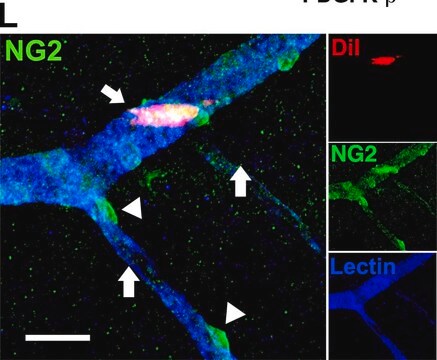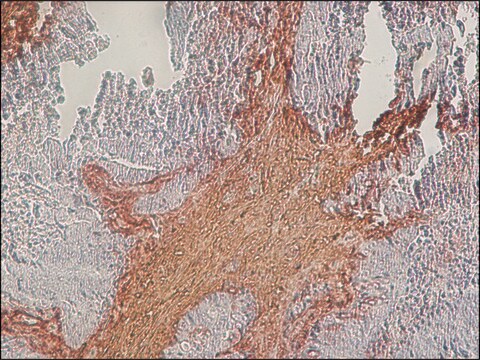추천 제품
생물학적 소스
mouse
결합
unconjugated
항체 형태
purified from hybridoma cell culture
항체 생산 유형
primary antibodies
클론
650.24, monoclonal
형태
buffered aqueous solution
분자량
antigen 260 kDa (additional band at 160 kDa)
종 반응성
rat
포장
antibody small pack of 25 μL
농도
~1 mg/mL
기술
immunocytochemistry: suitable
immunohistochemistry (frozen sections): suitable
indirect ELISA: suitable
western blot: 0.1-0.2 μg/mL using neonatal rat brain treated with chondroitinase.
동형
IgG1
UniProt 수납 번호
배송 상태
dry ice
저장 온도
−20°C
타겟 번역 후 변형
unmodified
유전자 정보
rat ... Ncan(58982)
일반 설명
Monoclonal Anti-Neurocan (mouse IgG1 isotype) is derived from the hybridoma 650.24 produced by the fusion of mouse myeloma cells (P3X cells) and splenocytes from BALB/c mice immunized with embryonic rat brain proteoglycans. Neurocan is a chondroitin sulfate proteoglycan (known also as CSPG3). It accounts for 20−30% of chondroitin sulfate proteoglycans in early postnatal rat brain. The mouse neurocan cDNA encodes for a 1,257-amino acid protein with a 22-amino acid signal peptide followed by an immunoglobulin-like domain and repeating motifs characteristic of the hyaluronic acid-binding region of aggregating proteoglycans. Neurocan is found in large amounts in glial scar, a primarily astrocytic structure formed after an injury in the central nervous system (CNS).
Neurocan is a proteoglycan which is expressed in the nervous tissue.
면역원
embryonic rat brain proteoglycans.
애플리케이션
Anti-Neurocan antibody, Mouse monoclonal has been used in:
- western blotting
- immunofluorescence
- enzyme-linked immunosorbent assay (ELISA)
- immunocytochemistry
- immunohistochemistry
생화학적/생리학적 작용
Neurocan can inhibit the growth of axons. In presence of central nervous system injuries, it also takes part in tissue repair and neural network reconstruction.
Neurocan participates in the modulation of cell adhesion and migration. It exerts a negative effect on growing cerebellar axons.
표적 설명
Neurocan is a chondroitin sulfate proteoglycan (knownalso as CSPG3) thought to be involved in the modulation of cell adhesion and migration. It accounts for 20-30% of chondroitin sulfate proteoglycans in early postnatal rat brain.
물리적 형태
Solution in 0.01 M phosphate buffered saline, pH 7.4, containing 15 mM sodium azide.
면책조항
Unless otherwise stated in our catalog or other company documentation accompanying the product(s), our products are intended for research use only and are not to be used for any other purpose, which includes but is not limited to, unauthorized commercial uses, in vitro diagnostic uses, ex vivo or in vivo therapeutic uses or any type of consumption or application to humans or animals.
적합한 제품을 찾을 수 없으신가요?
당사의 제품 선택기 도구.을(를) 시도해 보세요.
Storage Class Code
10 - Combustible liquids
WGK
WGK 3
Flash Point (°F)
Not applicable
Flash Point (°C)
Not applicable
시험 성적서(COA)
제품의 로트/배치 번호를 입력하여 시험 성적서(COA)을 검색하십시오. 로트 및 배치 번호는 제품 라벨에 있는 ‘로트’ 또는 ‘배치’라는 용어 뒤에서 찾을 수 있습니다.
AMPA Receptor Antagonist NBQX Decreased Seizures by Normalization of Perineuronal Nets
Chen W, et al.
PLoS ONE, 11(11), e0166672-e0166672 (2016)
Neurocan: a brain chondroitin sulfate proteoglycan
Rauch U, et al.
Cellular and Molecular Life Sciences, 58(12-13), 1842-1856 (2001)
Changes in neurocan expression in the distal spinal cord stump following complete cord transection: a comparison between infant and adult rats.
Qi ML
Neuroscience Research, 45(2), 181-188 (2003)
Characterization of the human neurocan gene, CSPG3
Prange CK, et al.
Gene, 221(2), 199-205 (1998)
Li Hong Shen et al.
Glia, 56(16), 1747-1754 (2008-07-12)
The glial scar, a primarily astrocytic structure bordering the infarct tissue inhibits axonal regeneration after stroke. Neurocan, an axonal extension inhibitory molecule, is up-regulated in the scar region after stroke. Bone marrow stromal cells (BMSCs) reduce the thickness of glial
자사의 과학자팀은 생명 과학, 재료 과학, 화학 합성, 크로마토그래피, 분석 및 기타 많은 영역을 포함한 모든 과학 분야에 경험이 있습니다..
고객지원팀으로 연락바랍니다.